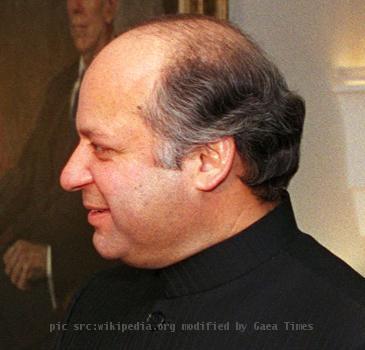Pakistan PM agrees to hold terrorism conference after opposition calls for Taliban talks
By Sebastian Abbot, APSunday, July 4, 2010
Pakistan PM agrees to hold terrorism conference
ISLAMABAD — Pakistan’s prime minister agreed to hold a national conference on ways to combat terrorism after the main opposition leader said the government should negotiate with the country’s Taliban militants to improve security.
Prime Minister Yousuf Raza Gilani’s decision late Saturday came just two days after a pair of suicide bombers killed 42 people at a famed Sufi shrine in Lahore, the capital of Punjab province where the opposition controls the government.
The agreement to hold a national conference represents a rare moment of consensus between the two parties, which have clashed over how to address the problem of growing violence in Punjab, the country’s richest and most populous region.
Officials in the ruling Pakistan People’s Party have called on the provincial government to crack down on militant groups once supported by the country’s intelligence agencies but now allied with the Pakistani Taliban against the state.
Members of the provincial government, which is controlled by the Pakistan Muslim League-N party, have resisted — a move analysts say is driven by its reliance on banned militant groups to deliver key votes during elections.
Opposition leader Nawaz Sharif added a new twist to the debate Saturday by calling for the government to negotiate with Pakistani Taliban militants “who are ready to talk and ready to listen.”
It was unclear exactly with which groups Sharif expected the government to talk. There are numerous militant organizations in Pakistan, and they often overlap and work together.
The government has brokered peace deals with Taliban fighters along the Afghan border in the past, but they have usually collapsed and have often given the militants time to regroup and consolidate their control.
Sharif’s push for talks comes as Pakistan tries to weigh in on reconciliation efforts in Afghanistan among the government, the United States and the Afghan Taliban.
The statement announcing that Gilani and Sharif agreed to hold a national conference on terrorism did not specifically mention the opposition leader’s call to negotiate with the Taliban.
Meanwhile, militants continued their campaign of violence in the country’s northwest near the Afghan border.
A roadside bomb struck a vehicle carrying members of an anti-Taliban militia in Dara Adam Khel on Sunday, killing two and wounding three others, said Mohammad Shafiq Khan, a local political official.
There was no immediate claim of responsibility for the attack, but suspicion fell on the Pakistani Taliban. One of the group’s key grievances is the national government’s close alliance with Washington.
The government is believed to support U.S. drone strikes against Taliban militants in the northwest, and up to 70 percent of the supplies for NATO troops in Afghanistan are shipped through Pakistan.
Those supplies travel along two different routes, one of which has been effectively blocked for the past four days by farmers protesting electricity shortages in the southwestern province of Baluchistan, said Omar Baloch, a senior police official in Kalat city.
The farmers have blocked hundreds of trucks making their way to Afghanistan from the southern port city of Karachi, Baloch said.
“Our method of protest will not only compel the government to forcefully ask America and European states to fulfill the country’s energy needs, but also attract the immediate attention of Western powers,” said Agha Taj Mohammad, one of farmers’ leaders.
Kevin Bell, a spokesman with the NATO force in Afghanistan, said the farmers’ actions were not affecting their operations.
Associated Press writers Riaz Khan in Peshawar, Abdul Sattar in Quetta and Deb Riechmann in Kabul, Afghanistan, contributed to this report.
Tags: Afghanistan, As-pakistan, Asia, Central Asia, Islamabad, Lahore, Nawaz Sharif, Pakistan, South Asia, Terrorism

